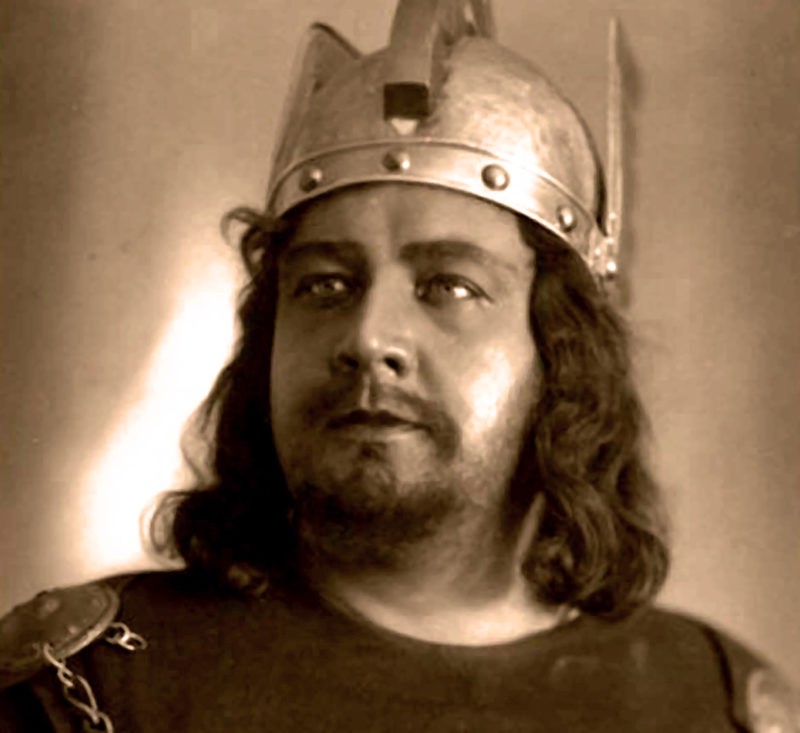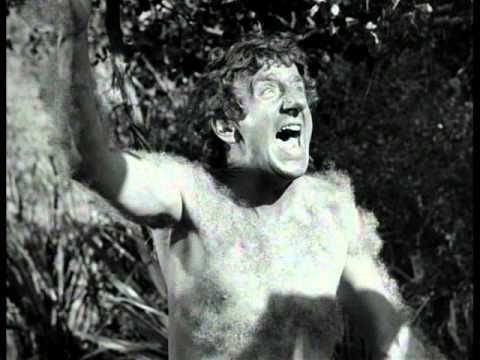OPRY LINKS 2: Types of Tenors!
From Lauritz Melchior
(heldentenor) to Jimmy Durante (heldenhonker). . .


Melchior
Durante
Saturdee Opry Links Overture.
Mozart: “The Magic Flute.”
https://www.youtube.com/watch?v=Mp6UAGN_Ir4
1.
What's this? A strange man in a terrible red suit and yellow shirt, sitting
in a tree, singing obnoxiously? What could this be about? Why, it's about
Rossini, and it's about the leggero tenor voice. The which? The tenor di
grazia voice, if you prefer. Yes, there are all types of tenors, and the
tenor of this particular tenor is light and elastic. (Juan Diego Florez's
voice is no longer light and elastic, by the way. It has broadened and
strengthened in middle age.) Okay, as we begin our survey of types of
tenors, here is JDF with "Ecco, ridente in cielo," from Rossini's pleasantly
insane "Barber of Seville." "Lo, in the smiling sky."
https://www.youtube.com/watch?v=SIfz8fNQw0U
Role: Count Almaviva, a young Spanish nobleman
Setting: Ouside Dr. Bartolo's house at daybreak
Synopsis: Count Almaviva has fallen in love with Rosina. He stands outside
of her house and serenades her.
Translation:
https://www.opera-arias.com/rossini/il-barbiere-di-siviglia/ecco-ridente-in-cielo/
EXTRA!
TALK LIKE AN OPERA GEEK: TYPES OF TENORS
https://www.npr.org/sections/deceptivecadence/2011/11/30/142945273/talk-like-an-opera-geek-tuning-into-tenors
2.
A lyric tenor is the next step up the tenorial ladder. As you would expect,
it is a larger voice than the leggero tenor, with greater range and fuller
overall sound. It is also the most common type of tenor voice, the sort of
mainstream, bread-and-butter fach. (What'd he say? "Fach" essentially means
"type of voice.") From Wiki: "the lyric tenor is a warm graceful voice with
a bright, full timbre that is strong but not heavy and can be heard over an
orchestra." There is a great range of lyric tenors, some with lighter
voices, some with gigantic voices (Pavarotti, believe it or not, was a lyric
tenor, basically.) Here is a fine one, with the odd name of Alfredo Kraus
(his father was Austrian, though Alfredo, born in the Canary Islands, was
Spanish through-and-through.) The first thing you are liable to notice is
just how beautiful the voice is. Here is wonderful Mr. Kraus with "Salut!
demeure chaste et pure," from "Faust," by Gounod. "I greet you, home chaste
and pure." An exemplary performance.
Synopsis:
Setting: The garden of Marguerite in a German city, 16th century.
Approaching Marguerite's house, Faust, the old man turned young, is struck
by the purity of the dwelling and the innocence of Marguerite inside. He
then goes on to thank Nature for creating the beautiful angelic creature
that is Marguerite.
https://www.youtube.com/watch?v=qc5MHPuGnNY
Translation:
http://www.aria-database.com/translations/faust08_salut.txt
EXTRA!
What is the difference between a lyric tenor and a leggero tenor?
https://www.quora.com/What-is-the-difference-between-a-lyric-tenor-and-a-leggiero-tenor
3.
Now, just to confuse matters, there is something called a Mozart tenor.
What, you wail, could this be? Why, yes, it's a tenor who is adept at
singing Mozart roles. It's that simple. Or this complicated: (from Wiki) "A
Mozart tenor is yet another distinct tenor type. In Mozart singing, the most
important element is the instrumental approach of the vocal sound which
implies: flawless and slender emission of sound, perfect intonation, legato,
diction and phrasing, capability to cope with the dynamic requirements of
the score, beauty of timbre, secure line of singing through perfect support
and absolute breath control, musical intelligence, body discipline,
elegance, nobility, agility and, most importantly, ability for dramatic
expressiveness within the narrow borders imposed by the strict Mozartian
style." Got it? If so, then I'm sure Fritz Wunderlich was the first name to
come to mind. He was a renowned Mozart tenor (yet was also versatile enough
to sing lyric roles, and had a downright mighty overall voice, when it was
called for.) Confused? Then I have succeeded! (Me, too, incidentally.)
Anyway, here is Mr. Wunderlich with Tamimo's lovely aria from Mozart's "The
Magic Flute." Live on stage with English subtitles.
https://www.youtube.com/watch?v=5f0HTCugl_Y
Translation:
https://www.opera-arias.com/mozart/die-zauberflote/dies-bildnis-ist-bezaubernd-sch%C3%B6n/
4.
The step after lyric tenor is generally agreed to be lirico spinto, or
spinto tenor. As I understand it, this is a lyric tenor (perhaps larger than
a regular lyric tenor) with ability to punch through thick orchestration on
the big notes. It's also a good name for a poodle. Lanza, Pavarotti, Caruso,
Corelli, Gigli, Bergonzi come to mind. Here is Franco Corelli from 1956 with
the rapturous aria, "Recondita Armonia," from Puccini's "Tosca."
Setting: The inside of a Roman church
Synopsis: Cavaradossi is painting a Madonna for the church and he has based
the painting on a woman who prays often at the church. He sings of the
differences between his picture of a fair Madonna and the darker beauty of
his love, Tosca.
https://www.youtube.com/watch?v=EJo7eUa5KR0
Translation:
http://www.aria-database.com/search.php?individualAria=304
EXTRA:
What is the difference between a lyric tenor and a spinto tenor?
https://www.quora.com/Whats-the-difference-between-spinto-tenor-and-lyric-tenor-tessitura
ARTICLE: GREAT SPINTO TENORS OF THE 20TH CENTURY
http://www.interlude.hk/front/musical-giants-20th-century-spinto-tenor/
5.
Here is another rather well-known spinto tenor. Domingo's singing, and very
quality of voice, are so beautiful that one tends to forget the tremendous
power he had. Here he is as Calaf in Puccini's "Turandot," singing "Non
Piangere, Liu." The soprano is the somewhat sadly eclipsed Leona Mitchell. I
suggest sticking through Domingo's aria and watching the rest of this
dramatic clip.
https://www.youtube.com/watch?v=KJsrxwl3bcc
Setting: The streets of Peking
Synopsis: After Liú begs him tearfully not to risk his life by playing a
deadly game to win the Princess Turandot, Calaf responds to her gently,
asking her not to weep.
Translation:
http://www.aria-database.com/search.php?individualAria=317
6.
Have your grasped the tenor of today's SOL theme? If you think you have,
this should fach you up. What in hell is the difference between a spinto and
a dramatic tenor? The most dramatic tenor roles in opera are sung by spintos
(even lyric tenors), so. . .Well, Wiki is not terribly helpful, saying only
"the dramatic tenor has an emotive, ringing and very powerful, clarion,
heroic tenor sound," and outlining the range. What's more, a little poking
around on the Internet reveals that there is some similarity between
dramatic tenor voices and (drum roll) lyric baritones! This suggests that
the dramatic tenor voice is generally, but not always, darker than the
spinto. Caruso (who was capable of singing baritone), became more of a
dramatic tenor than a spinto later in his career, as his voice darkened.
Interesting, eh? Mario del Monaco, "the man who could not sing quietly,"
qualifies as a dramatic tenor. Listen to how dark the voice is, and how
constantly powerful. The big notes are more steely in feel. . .Here he is
with "Vesti La Giubba" from Leoncavallo's "Il Pagliacci." Geese will bump.
https://www.youtube.com/watch?v=oN4zv0zhNt8
Setting: The entrance to a village, Calabria, Italy, 1860s
Synopsis: Canio sings that, although his love has betrayed him and his heart
is broken, he must go on and show a cheerful face to the world.
Translation:
http://www.aria-database.com/search.php?individualAria=595
EXTRA:
What is the difference between a dramatic tenor and a lyric baritone?
https://www.quora.com/What-is-the-difference-between-dramatic-tenor-and-lyric-baritone-with-regards-to-timbre-tessitura-and-vocal-range
7.
Canadian tenor Jon Vickers was referred to both as a dramatic tenor and a
heldentenor (more later). Here he is with the gorgeous classic aria, "La
fleur que tu m'avais jetee," from Carmen by Bizet. The only thing I can
recognize as belonging to a "dramatic tenor" are the way his voice has
baritonal qualities in the lower notes.
https://www.youtube.com/watch?v=itB1UlPFln4&list=RDEMHM3jiA5X3zuv_Z19yP54pQ&start_radio=1
Setting: The inn of Lillias Pastia
Synopsis: Carmen and José have just reunited after José's stay in prison for
releasing Carmen when he was supposed to be guarding her. She has danced and
played castanets for him but in the distance, he hears the call back to the
barracks and he says he must go. She becomes angry at him for leaving her.
Don Jose then responds by singing how the flower she threw to him kept him
going throughout his stay at the prison.
Translation:
http://www.aria-database.com/search.php?individualAria=45
8.
Tenored out? Not to worry, there isn't far to go, and the test will be
multiple choice. What? You think that examining the differences and nuances
of the tenor voice is frivolous? Worse, that it is elitist? Pshaw, ptui, and
poppycock. Would you rather examine the differences and nuances in politics?
This is balm by comparison, even if it is not your metier, right? So do a
little listening, head-scratching, maybe thinking. It's so much nicer than
the news. The next type of tenor we are turning over is the heldentenor
voice, or "heroic tenor." What? Dramatic tenor, heroic tenor, what in hell
could be the difference? Just this: the heldentenor voice exists exclusively
in and for German repertory. It requires enormous stamina, is marked by
great power in the big notes and a distinctly dark tonal quality. James King
was a great heldentenor, in his prime back in the '60's. Here he is with the
wrenching "Gott! Welch' Dunkel hier," from Beethoven's freedom-championing
opera, "Fidelio." What a voice!
Setting: The dungeon of a prison near Seville
Synopsis: Imprisoned and close to death, Florestan sings that even though
his life is now joyless, he can find solace because he has done his duty and
he knows that what he did was right. He then thinks that he sees a vision of
his wife Leonora coming as an angel to lead him to heaven.
https://www.youtube.com/watch?v=rTqvsX-3gvE
Translation:
http://www.aria-database.com/search.php?sid=dbb9885972abf5a340f03ac8bf4bb2d8&X=1&individualAria=345
9.
What does Jimmy Durante have in common with Wagner opera? You'll have to
watch the video. Perhaps the greatest of all heldentenors was the Danish
singer, Lauritz Melchior, who just seemed to have been gifted naturally with
this highly unusual voice. Among other feats, he sang 519 Wagner roles at
the Met between 1926 and 1950 (!). You will immediately hear how unusual his
voice was, a kind of perfect heldentenor manifestation of tenorial power
shot through with a dark, steely quality. Here he sings "Walter's Prize
Song" from Wagner's comic opera exalting love and brotherhood, "Die
Meistersinger von Nurmberg." This is the transporting, "Morgenlich leuchtend
im rosigen Schein."
https://www.youtube.com/watch?v=-cqnATSWX6I
Setting: a meadow outside of Nuremburg, Germany, mid-sixteenth century
Synopsis: Walter sings his Prize Song for the song contest. It is a
beautiful and magical piece which poetically describes his love for Eva.
Translation: (search for "Morgenlich")
http://www.murashev.com/opera/Die_Meistersinger_von_N%C3%BCrnberg_libretto_English_German
Good night, Mrs. Wotan, wherever you are. . .
FINAL BOW:
Now, there is also something called a "tenor buffo," which is a tenor voice
specializing in "character acting," I guess you could say, in comic roles.
You'll be pleased to know that we are skipping that one, and bowing out with
the great spinto Jussi Bjorling. Which brings up a salient point: as with
many great tenors, he could (and did) sing roles suited for Mozart, lyric,
spinto, dramatic, even heldentenors. Hmm. . .Here is young Jussi with the
aria that Toscanini demanded Puccini add to the otherwise comparatively
abstract "La Fanciulla del West." This is "Ch'ella mi creda," in 1935---sung
in Bjorling's native Swedish, no less. And so endeth the lesson.
https://www.youtube.com/watch?v=a65x0inysZg
About the aria, translation:
https://en.wikipedia.org/wiki/Ch%27ella_mi_creda



